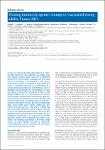Waning immunity against mumps in vaccinated young adults, France 2013
Vygen, Sabine
Fischer, A.
Meurice, L.
Njoya, I. Mounchetrou
Gregoris, M.
Ndiaye, B.
Ghenassia, A.
Poujol, I.
Stahl, J. P.
Antona, D.
Strat, Y. Le
Levy-Bruhl, Daniel
Rolland, P.
In 2013, 15 clusters of mumps were notified in France; 72% (82/114) of the cases had been vaccinated twice with measles-mumps-rubella vaccine. To determine whether the risk of mumps increased with time since the last vaccination, we conducted a case–control study among clusters in universities and military barracks. A confirmed case had an inflammation of a salivary gland plus laboratory confirmation in 2013. A probable case presented with inflammation of a salivary gland in 2013 either lasting for > 2 days or with epidemiological link to a confirmed case. Controls had no mumps symptoms and attended the same university course, student party or military barracks. We collected clinical and vaccination data via web questionnaire and medical records. We calculated adjusted odds ratios (aOR) using logistic regression. 59% (50/85) of cases and 62% (199/321) of controls had been vaccinated twice. The odds of mumps increased for twice-vaccinated individuals by 10% for every year that had passed since the second dose (aOR 1.10; 95% confidence interval (CI): 1.02–1.19; p = 0.02). Mumps immunity waned with increasing time since vaccination. Our findings contributed to the French High Council of Public Health’s decision to recommend a third MMR dose during outbreaks for individuals whose second dose dates > 10 years.
No license information

